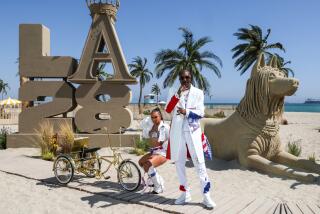Rogue Runners : Racers Stage Their Own Marathon Despite Long Beach Event’s Cancellation
Sporting flashy shorts and double-bottle fanny packs, the 50 runners gathered in front of the Long Beach Convention Center had drawn no official attention by 6:45 a.m. Sunday.
But some prepared a story just in case.
“If the police come, we’re holding an AA meeting,” quipped one of the veteran long-distance runners.
The coast was still clear minutes before 7 a.m. when Dave Saunders, who for months had helped organize the assembly, called an end to the stretching.
“Obviously, nobody told you people the 15th annual Long Beach Marathon was canceled,” he announced.
Actually, the runners knew the race had been called off in November because a shortage of sponsors left organizers with no money for timers, awards or even a city permit.
But most of them were die-hards who had run the Long Beach event every year since it began in 1982, and they were going to uphold the tradition--and risk being cited by police for unlawful obstruction of traffic.
A few served as lookouts as the runners lined up across Ocean Boulevard. Because somebody had forgotten the starting pistol, their voices formed a chorus, counting down from 15.
Missing this year were the music of bands and ovations from spectators. Instead, the runners quickly realized who their audience would be--the motorists stalled at green lights while they briefly clogged intersections. None of the blocked drivers apparently notified police, however. Asked later whether authorities had been aware that the unofficial race had gone off, a watch commander answered, “It did?”
It was a true “fun run.” No one pushed a competitive pace, and the leaders soon settled into seven-minute miles.
The third mile brought a fond memory to psychologist Phil Newberg, 59, another of the run’s organizers. One year, he said, a man stood there holding a sign that said “Repent” while telling runners they were “going to hell” for competing on the Sabbath.
Eight years ago, Newberg’s running partner, Dave Purucker, ran the race just six weeks after a triple-bypass heart operation. At 63, he completed the course again Sunday, just as he has every year since it began.
With such dedicated participants, November’s red flag was a shocker, even after years of declining sponsorships and donations. Despite registration fees of $35 per runner, organizers were coming up far short of the $300,000 necessary to pay for awards, support stations, permits and insurance.
“The board said if we can’t put on a safe marathon, it just really wasn’t worth doing,” said marathon President Jack Rose. He and other organizers distanced themselves from Sunday’s run, they said, to protect the event’s official standing.
Marathon cancellations have become increasingly common since the sport’s peak in the mid-1980s. Except for the Los Angeles, New York and Boston “mega-marathons,” a shortage of regional sponsors endangers races all over the United States, said Amby Burfoot, executive editor of Runner’s World magazine.
But a recent swell in the sport’s popularity could rejuvenate it, Burfoot said. “I think that marathons and marathon running are extremely healthy,” he said.
To be sure, Sunday’s run had glitches. Because the course was unmarked, the race leaders at one point wandered two miles off the intended route.
Still, the mix-up was shrugged off as soon as it became evident at mile 13, where friends and family staffed a support station--and were amazed to see runners arriving from both directions.
Among those handing out cups of water were relatives of former marathon director Bob Fernald, who suffered a fatal heart attack during a training run last year. Organizers had decided early on to dedicate Sunday’s run to his memory, dubbing it the Bob Fernald Memorial Marathon.
Despite its financial troubles, many predict the official Long Beach Marathon, which drew 2,500 entries last year, will return, perhaps soon. Under a plan being negotiated with the Los Angeles Marathon, a March event, the Long Beach race would move from its usual February date to November. That could help both races by reducing competition over sponsors and runners, who seldom compete in two such races just a month apart.
“I’m cautiously optimistic that that in fact will happen,” said Bill Burke, president of the L.A. Marathon, perhaps the richest race in the sport. He has offered to help raise money for the Long Beach event in exchange for the rescheduling.
There was no tape or chalk to mark the finish line, so sweating runners simply stopped when they came full circle and reached the back of the Convention Center about 10:30 a.m. Even as they doubled over, muscles cramping, some finishers renewed plans to do it all again, but perhaps without having to worry about the cops the next time.
“If they crank it up in November, great,” Newberg said. “We’ll run it again.”
More to Read
Go beyond the scoreboard
Get the latest on L.A.'s teams in the daily Sports Report newsletter.
You may occasionally receive promotional content from the Los Angeles Times.










